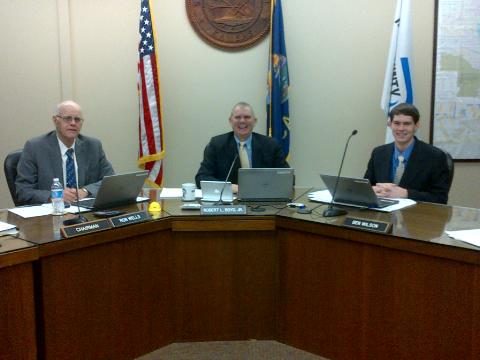Property owners typically want high values if they plan to sell, according to county officials. But that’s not the case when it comes to tax time.
Those two very different wants have made life difficult for county appraisers across the state, and the Kansas County Appraisers Association wants to address those competing views from property owners when the legislature reconvenes in January.
Thursday morning, Riley County commissioners signed a letter of support for the KCAA’s 2017 legislative proposals.

County appraisers have been critical of Topeka lawmakers in recent years, especially when the state revamped its valuation appeals process in 2014.
Riley County Appraiser Greg McHenry told commissioners the new appeals process favors commercial tax representatives and more legislation coming down the pipe could favor them even more.
“In my view, and in the view of the Kansas County Appraisers Association, that’s what’s happened,” McHenry said. “House Substitute for Senate Bill 280 was kind of the last straw, in some of our opinions, in terms of the fairness and equity issue, and the evaluation process.
“This legislation that was proposed, and has been the last couple years, usually comes from that group of people who have a very vested interest in legislation that would make the system one sided.”
The commission’s letter reads:
September 1, 2016
Kansas Association of Counties
Legislative Policy Committee
300 SW Eighth Ave., Suite 300
Topeka, KS 66603
Re: Support for the 2017 Legislative Proposal of Kansas County Appraisers Association
Dear Members of the Committee:
Please accept this as the Board of Riley County Commissioners’ unanimous support for the 2017 legislative proposal of the Kansas County Appraisers Association regarding H Sub for SB280.
We believe it is essential every property tax statute must be fair to both parties in any dispute over valuation. Neither the taxpayer nor the county should be provided an unfair advantage when the taxpayer challenges a property’s value. The legislative proposal from the County Appraisers Association promotes that fairness.
This Board has reached that conclusion by reviewing the proposal with Riley County Appraiser Greg McHenry.
We encourage your committee to support the association’s recommendations as part of the KAC legislative policy statement for 2017.
According to state statute, county appraisers must meet a median sales ratio that falls between 90-110 percent of a residential or commercial property’s market value.
In 2015, McHenry’s office was within market value of residential properties by 97 percent and is on track for a similar percentage for this year.
But commercially, Riley County was just within 81 percent of market values in 2015 and may be lower than that by the end of this year.
In 2012, before the appeal process was refashioned, Riley County was 100 percent within commercial market values.
McHenry said the low commercial percentages are common for counties across the state that have more commercial properties since the appeals process has been retooled.
The proposed changes to SB280 the appraiser’s association would like to see largely ask the legislature to require commercial tax reps to exchange the same information counties are required to produce.
To put it simply, they want commercial tax reps’ appeal case to be put under the same standards counties are held to when it comes to their case in the process.
“It’s about accuracy,” McHenry said.
In February, the Kansas Supreme Court ruled one aspect of the appeals process introduced in 2014– freezing a property’s value for three years after a successful valuation appeal — was unconstitutional due to complications that could arise when it comes to market equity.
Still, the appeals process is a mess, according to county officials.
Riley County counselor Clancy Holeman said Thursday morning a state-wide reappraisal of property — something that hasn’t been done since 1989 — could happen again in the near future and at a great cost to every form of government from the county level to Topeka.
“They try and lower taxes through this disconnect of tampering with the way that values are assigned, which is illogical,” Holeman said. “That has appeal, to some folks, but the problem is that you’re injecting some anomalies in the valuation process that eventually are going to come back to haunt you — there’s no way they cannot.
“Because once the values get so far out of whack over time, with the fair market value, there will be need for reappraisal statewide, if this kind of thing continues. There is no way that that will not happen. It’s just a question of when.”
Commissioner Ron Wells appreciated McHenry’s breakdown of the situation.
“I like Greg’s common sense approach,” he said. “It’s just common sense — but of course we don’t see much of that down at the state anymore. It’s severely lacking, and I don’t know why. I think they’re too focused on themselves, their income and their vanity, I think.”


